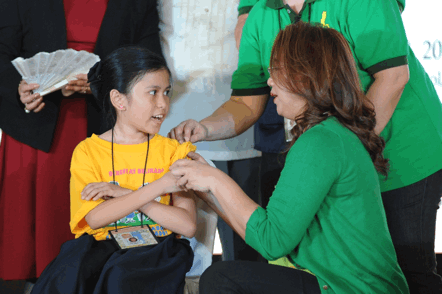- by KRIZETTE CHU
Dengue Vaccine Facing Political Resistance in the Philippines, Where It is Most Needed

Philippines politicians threaten to cut health budget, vaccine program at risk
Lawmakers in the Philippines are holding a Congressional hearing on the 2017 annual budget—the first budget planned under the new government led by President Rodrigo Duterte. Some politicians have trained their sights on the P3 billion (€55.7 million) dengue vaccination program kick-started last April under then President Aquino.
On October 11, Senator Richard Gordon said that he may file a formal resolution to investigate the provision of the vaccine, the first dose of which has already been given to almost half a million children. This comes in the wake of calls from other government officials and private groups to temporarily put the program on hold.
The Philippines is the first country in Asia – and the second in the world – to have approved the world’ first dengue vaccine, Dengvaxia. It is also the first country in the world to make the vaccine commercially available.
Dengvaxia is a tetravalent vaccine taken in three shots at six-month intervals and is recommended for individuals aged 9 to 45. Due to the difficulty of creating a vaccine capable of protecting against all four dengue serotypes, Dengvaxia was 20 years in the making. 25 clinical studies were conducted in 15 countries, with over 40,000 subjects included in the research phase. The Philippines participated in each phase of the study. The vaccine is now approved in nine countries including Brazil, Mexico, El Salvador, Paraguay, Costa Rica, Guatemala, Peru, and Indonesia.
Many who opposed the introduction of the vaccine the first time did so on the grounds that the World Health Organization (WHO) had not given its “go-signal” at the time. However, the WHO has since recommended the vaccine’s use in dengue-endemic countries or regions.
WHO estimates that almost 1 hospitalization every minute results from dengue infection. With the help of vector control and the vaccine, the organization hopes to reach its goal of reducing mortality by half, and morbidity by 25 percent by 2020.
In a statement, the WHO said that the vaccine is urgently needed as the growing global epidemic has become a serious concern, with 3.9 billion at risk: “WHO expects vaccines to be an integrated part of the global dengue prevention and control strategy.”
Read more about why experts claim an integrated approach to controlling dengue remains essential

Not only is the Philippines a dengue-endemic country—one of more than a hundred—the mosquito-borne illness was also first recorded here as far back as 1954.
“It is actually the Philippines leading the way, taking ownership of the disease,” says Prof. Tikki Pang of the National University of Singapore’s Lee Kuan Yew School of Public Policy. “The Philippines has the world’s first public dengue immunization drive, and that sends a message. After all, dengue fever was initially known as Philippine hemorrhagic fever.”
The Philippines, he added, has been at the forefront of the studies, having participated in all three phases of the vaccine’s clinical studies. This, he says, cemented its pioneering role and leadership in dealing with a major public health program.
More than fifty years later, the country is still grappling with controlling dengue, logging an average of 150,000 cases a year, representing a significant cost burden. The estimated cost per hospitalized case can reach $565, which may be more than one month’s income for the average family in the Philippines.
According to Dr. Su-Peing Ng, global medical head of Sanofi Pasteur, dengue impacts a country’s economy: “The Philippines spends P16.7 billion a year dealing with this disease. For one hospitalized patient that would be about P27,000 worth of bills not including the lost days in school or work.”
Prof. Tikka Pang continues, “Aside from the individual protection from the illness, there is also indirect protection for the whole population, and reduction in frequency and size of the outbreaks if many people will get vaccinated.”
Despite calls for the discontinuation of the public program, many private doctors have endorsed the vaccine, recommending it to their patients. In an interview for this article, Dr. Cynthia Balza Gomez, a pediatrician at the Medical City, says she has had many patients ask for the vaccine and has not personally seen any adverse reactions or side effects.

Dr. Gomez says resistance to Dengvaxia is typical of the dogged opposition new vaccines face. Like the vaccine against HPV, she says, anti-vaccine campaigns play on safety fears, even when the safety and efficacy of the vaccine have been reaffirmed by numerous investigations.
The country’s government-funded, public-school-based dengue vaccination program has benefited 489,003 Grade 4 pupils in the National Capital Region, Central Luzon (Region 3) and Calabarzon (Region 4A). Within four months, the program has achieved 67 percent coverage.
On Oct. 4, the Department of Health (DOH) announced that it plans to expand the immunization program to include students in Central Visayas, and wants to start the first dosage this month.
And it may be just as well. Despite recording 200,000 dengue cases in 2015, higher than average, the DOH has already listed nearly 71,000 suspected dengue cases as of July, a 19 percent increase from the same period.
—

